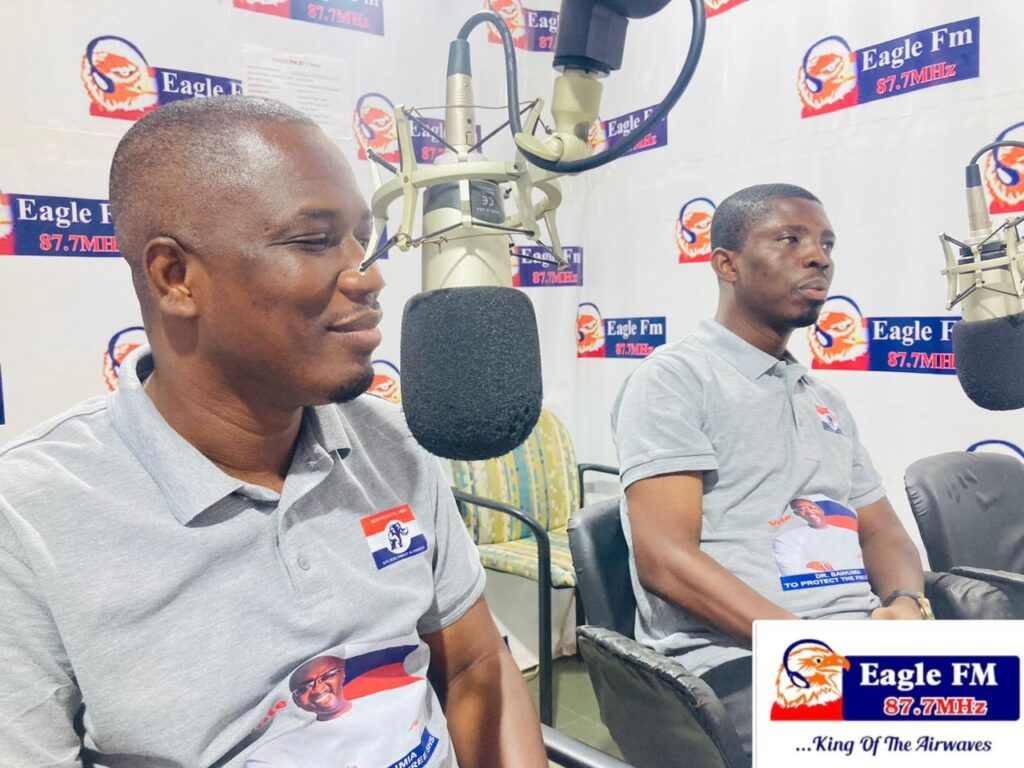
(L) Dr. Frank Bannor of the Ghana Institute of Management and Public Administration (GIMPA) and Dr. Eric Boachie Yiadom, Senior Lecturer at the University of Professional Studies, Accra (UPSA)
By Bright Philip Donkor
Two prominent academics, Dr. Frank Bannor of the Ghana Institute of Management and Public Administration (GIMPA) and Dr. Eric Boachie Yiadom, Senior Lecturer at the University of Professional Studies, Accra (UPSA), have described Ghana’s 2024 general election as a pivotal referendum on the Free Senior High School (Free SHS) policy. The lecturers, both members of the advocacy group University Teachers for Free SHS Ghana, argue that the election’s outcome will determine the fate of this transformative educational initiative.
Speaking during an interview on Eagle FM in Cape Coast, the lecturers emphasized that the Free SHS policy, introduced by the New Patriotic Party (NPP) in 2017, has revolutionized access to education for millions of Ghanaian youths. They stated that the upcoming election represents a choice between safeguarding and expanding the policy or risking its derailment under a different administration.
NPP is the ‘Biological Parent’ of Free SHS
Dr. Eric Boachie Yiadom lauded the NPP for its bold introduction of the Free SHS initiative, despite the economic challenges that accompanied its implementation. He described the NPP as the “biological parent” of the policy, which he argued ensures the party’s unwavering commitment to its growth and sustainability.
“The NPP has proven its dedication to the Free SHS policy, nurturing it from its inception and overcoming significant economic hurdles to ensure its success. They are the biological parents of this initiative, and their stewardship guarantees its continuity and expansion,” Dr. Boachie remarked.
He contrasted this with the record of the National Democratic Congress (NDC), accusing the opposition party of mismanaging critical policies in the past, such as the near-collapse of the National Health Insurance Scheme (NHIS). He questioned the NDC’s capability to handle the Free SHS program effectively if given the mandate.
“The NDC’s promises to ‘better manage’ Free SHS lack credibility, given their history of neglect and mismanagement. When a policy as transformative as this is at stake, entrusting it to those with a questionable track record is a risk we cannot afford to take,” he stated.
Decision Based on Trust & Track Record
Dr. Frank Bannor reinforced the significance of the 2024 election, describing it as a choice between progress and regression for Ghana’s educational landscape. He stressed that the electorate must evaluate political parties based on their track records, trustworthiness, and commitment to the future of Ghana’s youth.
“This election transcends campaign promises; it’s about trust and proven dedication. The electorate faces a clear choice: continue the journey with the originators of Free SHS or risk a reversal of the gains made under this policy,” Dr. Bannor stated.
He highlighted the positive impact of Free SHS in reducing financial barriers to education, increasing enrollment, and bridging the gender gap in secondary school participation. Dr. Bannor cautioned that entrusting the Free SHS program to Mahama’s leadership could result in mismanagement, thereby undermining its achievements and endangering the future of Ghana’s youth.
“The stakes couldn’t be higher. This election is not just about leadership; it’s about securing the future of education in Ghana. The Free SHS policy is too significant to be left in uncertain hands,” he emphasized.
Referendum on Ghana’s Future
Both lecturers framed the 2024 election as a referendum on the Free SHS policy, urging Ghanaians to critically assess the competence and track records of the political parties vying for power.
“This is not just an election—it is a referendum on the Free SHS policy and the future of our children. Voters must choose leaders who have demonstrated the vision and capability to sustain and improve this critical program,” Dr. Boachie reiterated. He added that the outcome of the election would have far-reaching implications for Ghana’s socio-economic development, underscoring the need for voters to prioritize education as a cornerstone of national progress.




